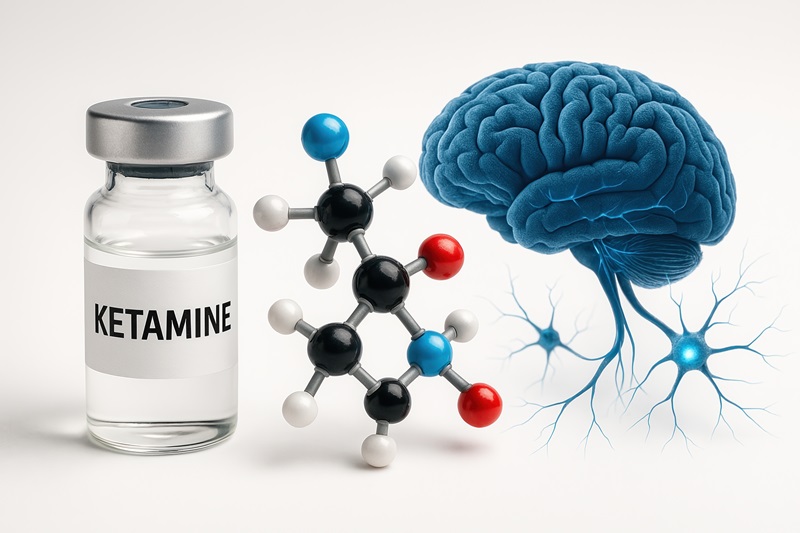Ketamine-Assisted Psychotherapy: A Promising Treatment for Anxiety and PTSD

In recent years, Ketamine-Assisted Psychotherapy has emerged as a beacon of hope, offering renewed optimism for those who haven’t found healing through conventional approaches. For individuals living with chronic anxiety or post-traumatic stress disorder (PTSD), traditional treatments like talk therapy or medication don’t always provide sufficient relief. Take Charge Inc. of Overland Park, KS, does KAP treatments and would love to talk about the process and benefits of ketamine-assisted psychotherapy.
Ketamine, a medication originally used as an anesthetic, is now being recognized for its ability to rapidly reduce symptoms of depression, anxiety, and trauma-related disorders. When combined with psychotherapy, ketamine can help clients access deep emotional insights, break through mental barriers, and process traumatic memories in a new, transformative way. Embarking on the journey of ketamine-assisted psychotherapy can be both exhilarating and a process, but with the guidance of a skilled therapist like Terri Dichiser, the process becomes more manageable.
Ketamine-assisted psychotherapy stands out as a potent, rapid-acting solution for those grappling with anxiety and PTSD. By bolstering neuroplasticity, quelling fear responses, and fostering deeper emotional processing, it empowers individuals to reclaim command over their mental well-being. Unlike certain medications that may take weeks to kick in, ketamine often starts to show results within hours or days, offering relief. And while traditional talk therapy can sometimes feel like a longer journey, KAP may enable people to confront and process emotional pain more directly and effectively. Some of the ways ketamine-assisted psychotherapy proves effective for anxiety and PTSD include:
- Rapid Symptom Relief: Many feel relief within hours or days, unlike traditional medications that take weeks.
- Disrupts Trauma Cycles: PTSD often traps individuals in a loop of fear and re-experiencing trauma—ketamine can help break this cycle.
- Reduces Avoidance: Many people avoid emotions related to trauma. Ketamine helps them process these emotions safely.
- Enhances Emotional Resilience: KAP helps individuals develop long-term coping skills by promoting new neural connections.
The process of ketamine-assisted psychotherapy takes many forms, but we will focus on how Terri Dichiser’s course of action works. Here’s a more in-depth look at the process of KAP:
- Initial Assessment – The process begins with an extensive assessment by a mental health professional to determine if KAP is appropriate for the individual. This includes a review of the patient’s medical history, mental health symptoms, and previous treatment experiences. Clients and therapists collaboratively establish treatment goals and discuss what to expect from KAP.
- Preparation Phase – Clients are educated about ketamine, including its effects, potential side effects, and the nature of the treatment. This helps set expectations and reduce anxiety about the process. It also helps build a trusting relationship between the client and therapist, essential for effective therapy. This rapport facilitates open communication during the sessions.
- Ketamine Administration – The sublingual route is the preferred method at Take Charge. Ketamine administration occurs in a controlled, comfortable environment, always with the therapist present to ensure emotional safety and comfort.
- Psychotherapy Sessions – Psychotherapy typically occurs during or shortly after the ketamine session. The altered state of consciousness induced by ketamine can enhance the therapeutic experience. Clients are encouraged to explore thoughts, emotions, and insights that arise during the ketamine experience. Therapists guide discussions, helping clients process and integrate these experiences into their understanding of their mental health.
- Follow-Up Sessions – After the initial sessions, therapists monitor clients’ progress, address any ongoing issues, and make necessary adjustments to the treatment plan. Therapists may also introduce coping strategies or skills learned during the psychotherapy sessions to help clients manage symptoms in their daily lives.
- Completion and Maintenance – At the end of the treatment cycle, clients and therapists review progress toward treatment goals, discussing what worked well and what may need further attention. Some clients may choose to continue with traditional therapy or opt for maintenance ketamine sessions to support ongoing mental health. This comprehensive approach ensures that the benefits of KAP are sustained over time.
At Take Charge Inc., we understand that exploring new therapeutic options can feel overwhelming. If you’re curious about ketamine-assisted psychotherapy and whether it might be right for you, we’re here to provide support, education, and trusted referrals. The field is evolving, and Take Charge Inc. is embracing this modality to play a vital role in ensuring the safety, efficacy, and ethical implementation of ketamine-assisted psychotherapy sessions. Contact Terri Dichiser, owner of Take Charge Inc., at (913) 239-8255 to discuss your options today.
